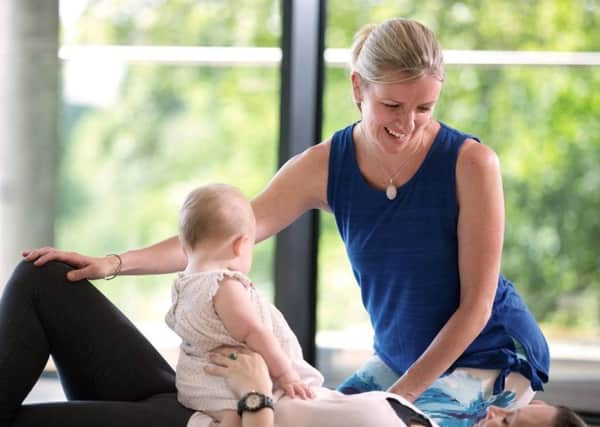How Leeds mother is helping women to recover from impact of birth


Postnatal care is often dubbed the ‘Cinderella’ of maternity health services, Mumsnet said as it launched its Aftercare, Not Afterthought campaign last May.
Its aim is to bring focus to a service “neglected for too long”, exploring women’s experiences in hospital after having their babies, maternal mental health and care for birth injuries. Figures it released in April, from a survey of women who gave birth between 2013 and 2016, found 42 per cent of mothers experienced problems with continence or their pelvic floor.
Advertisement
Hide AdAdvertisement
Hide AdIt is something with which Leeds fitness instructor and mum-of-three Louisa Thomas is all too familiar. After childbirth left her with abdominal diastasis - the separation of her stomach muscles - she researched alternatives to surgery and now teaches an exercise programme to postnatal women suffering with core and pelvic floor issues. “There is very little support, knowledge and advice available to women wanting to recover postnatally or for women suffering from core-related issues, such as incontinence,” she says.
“Many are under the impression that it is simply something that they must live with or correct it through surgery. After having three babies in four years, my abdomen was a mess, and I was told the only option for healing my diastasis was surgery. I was determined to heal in a more holistic way, so set about on a journey of discovery.”
Louisa, aged 44, says she was told she had abdominal separation in a six-week check-up following the birth of her first baby in 2012. After having her second child, she attended an exercise class organised by a women’s health physiotherapist and was left “feeling sick” after being given “a look of wow” following a check of her stomach. Told by an osteopath that the gap would unlikely heal without surgery, Louisa began researching exercises she could do to try and repair her abs and now teaches a rehabilitation movement programme called Restore Your Core.
“Findings in movement sciences are always evolving, but sadly many healthcare professionals are not aware of some new techniques available, and are still prescribing very outdated, simple and often detrimental exercises to women looking to strengthen their core or pelvic floor,” says Louisa, who has spoken to osteopaths and hopes to also work with GPs, physiotherapists and midwives. She wants to see women given more information about birth injuries and healing, and reassurance that their concerns are valid.
Advertisement
Hide AdAdvertisement
Hide Ad“As a culture we often neglect the needs of women post birth and place all the focus on the newborn... Women are told to just put up with symptoms like incontinence or a mummy tummy, and many women think it’s just an inevitable part of motherhood,” she says.
Mumsnet founder Justine Roberts says that through the Aftercare, Not Afterthought campaign, it has become clear that relatively few women proactively seek treatment for low-level weakness or incontinence. “This is partly because the symptoms can be embarrassing, and partly because as a society we tend to think of slight urinary incontinence as being ‘normal’ for mothers - which it shouldn’t be. And, sad to say, the evidence is that some GPs are underconfident when it comes to dealing with this issue, and may minimise it and say it’s nothing to worry about.”
The parenting website is now banding together with other groups to press for better care for postnatal pelvic floors as well as more awareness among new mothers and self-confidence in seeking treatment.
“There’s a growing recognition on all sides that this issue is important - affecting, as it can, women’s entire lives post-birth - and in our conversations with health professionals we’ve seen a lot of willingness to change things for the better.”
